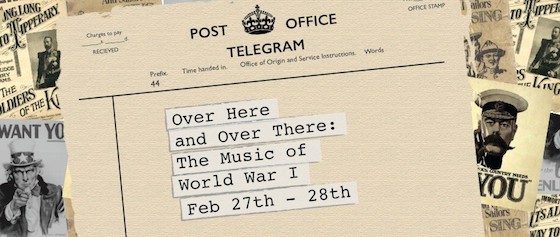Alex Wilson will give the fourth performance of my latest solo piano work, a drawing-down of blinds, as part of a World War I conference in York on Saturday 28th February.
Alex commissioned the work for The Banks of Green Willow, a tour of Bristol, Exeter and Gloucester Cathedral, to voice a contemporary reflection on the Great War.

The York performance will be at the end of a two-day conference, Over There and Over There: The Music of World War I. Alex will play in an evening concert, ‘After the Lusitania’, to include the University of York Chamber Orchestra playing Frank Bridge’s Lament for string orchestra. Lament was written in response to the sinking of the Lusitania on 7th May 1915. Charles Ives responded to the same disaster in his Second Orchestra Set, performed here last week.
And each slow dusk a drawing-down of blinds.
Wilfred Owen, ‘Dulce et decorum est’
How can one begin to contemplate an experience as black, an event as monumentally catastrophic, as the Great War? How does one cope with such a memory? What of the experience one cannot fathom from the distance of time? These questions formed my research for the piece.
I am always struck by the sight of a grand piano alone on stage, black, motionless, silent. After discussion of potential themes with Alex, my aim was to dramatise the physicality between pianist and piano to explore the idea of the weight of the past.
We met to devise physical action which I then composed into notated music, some of which is unmetered (without a regular pulse or barlines). The hope is that through how the pianist is seen to interact with the piano, remembrance — the act of remembering — becomes the focus of the piece.
I am indebted to Geoff Dyer’s recent book The Missing of the Somme for its insightful reflections on the war’s significance to us today, and for four quotations which mark interlinked sections in the score. A fifth quotation appears after the final bar.
‘an incomprehensible look…
it was more terrible that terror, for it was a blindfold look,
without expression’
‘Even when the blinds are raised, the sudden rush of light reveals
how much is – and will remain – concealed, missing.’
‘One does not fight with men against matériel,
it is with matériel served by men that one makes war.’
‘The war goes on, silently, visibly.’
‘When we have been there long enough,
we get up and leave, turn the page and move on.’